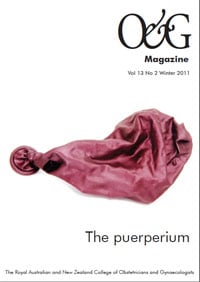Obstetricians learn to expect the unexpected, but the same cannot necessarily be said of the expectant women we care for, for whom any unexpected pregnancy outcomes can have a long-term negative impact.
Jane recently contacted our unit requesting postnatal counselling. She had been diagnosed with severe depression and post-traumatic stress disorder (PTSD) as a result of her first birth three years earlier and was too traumatised to have the further pregnancy that she desperately wanted. That previous birth was complicated by an abruption in labour, requiring an emergency caesarean section. Both she and her baby had a ‘medically uncomplicated’ course following this. During counselling, Jane explained that she felt that her concerns had not been listened to during labour and her requests for pain relief had been ignored, and that this feeling of lack of control had led to all her subsequent problems. In fact, on further discussion, she did not know why she had the caesarean and was unaware that there had been an abruption.
Jane’s case illustrates some important issues about the psychological impact of birth:
- Events that may appear trivial to us from a medical perspective can have a severe effect on the woman.
- There can be severe emotional trauma following what we may regard as a satisfactory birth outcome.
- The woman’s perception of the birth is often very different from our own.
Seek and you shall find
All women need to talk about their experience of having a baby and, for most, this will happen informally with friends, family, in mothers’ groups and in other social settings. As doctors, we need to be part of this process, particularly if there has been an unexpected outcome; where ‘unexpected’ may be anything ranging from a serious morbidity to the sense of disappointment after operative delivery instead of a normal birth.
The starting point is talking to women after their birth and before they leave hospital. For many women this may be all they need, but it is also the opportunity to identify those women who would benefit from follow-up counselling following discharge. In our own unit, we offer formal follow-up counselling after unexpected outcomes. Over the last ten years, we have invited 1850 women to return, of whom 242 have attended. These figures suggest that the majority of women are happy with their initial postnatal ward discussion, but highlights that a small number of women feel that they would benefit from more in-depth counselling.
Counselling 101
Regardless of the severity of the unexpected outcome or the timing of the counselling, the principles are always the same:
- Start with an open question. For example, ask the woman how she felt about the birth from her point of view.
- Listen. Let her tell her story uninterrupted.
- Acknowledge her story. Relate back to her what you have heard.
- Ask the woman if she has any questions about what happened.
- Apologise for what has happened. Saying you that you are sorry for what she has been through is not an admission of wrongdoing.
- Openly discuss and provide accurate information about what happened.
- Outline a plan. This may include a plan for future pregnancies or in some instances a reassurance that changes to future practice will be made where a systemic problem has been identified.
- Offer further follow-up. This could be further formal counselling, a planned routine postnatal visit, details of community support groups or who to contact if she has further questions or concerns.
- Document everything that has been discussed.
- Communicate with other health professionals responsible for the woman’s care. Failure of continuous communication can sometimes undo progress that has been made if there are misunderstandings between care providers.
Fine tuning
If you do all of the above, but are interrupted, called away, pressured for time or simply not the right person for the job then the woman will inevitably feel that she is not being taken seriously and the process will fail. To avoid this:
- Allocate enough time and ensure you have no other commitments at that time.
- Choose a quiet location such as a meeting room.
- Counselling should be led by the most senior member of the team to confirm to the woman that her concerns are being taken seriously. Other staff involved in the woman’s care can also be present.
- Other family members should be accommodated if they wish to attend. It is not unusual to find during counselling that they have also been affected by the unexpected outcome.
While these arrangements may not be practical in an initial postnatal ward discussion, this is one of the reasons that it is important to identify women who would benefit from further extended counselling at a later stage.
Pitfalls
In a recent survey of women who had attended our counselling service, we received overwhelmingly positive feedback. There was, however, a consistent theme in the small number of negative comments where women felt that there had been a defensive and justifying approach to counselling rather than listening and providing information.
The clear message here is to be open, honest and provide objective information that will help the woman understand what has occurred and why. Rationalising or being defensive is more likely to make the woman wonder what you are trying to cover up.
After the fact
In a specialty where timely intervention can be crucial, obstetricians sometimes overlook the interventions that are necessary after the fact. Factum, in Latin, refers to ‘a thing done or performed’ and in modern English ‘something that has really occurred’, hence the legal term ‘accessory after the fact’. If we are to avoid being an accessory to suffering after an unexpected outcome of pregnancy we must proactively listen to women’s stories after childbirth and provide appropriate information and support.
Acknowledgement
I would like to acknowledge our clinical nurse consultant, Cheryl Rutherford, for her work in establishing, coordinating and reviewing our Postnatal Counselling Service at Nambour Hospital.






Leave a Reply